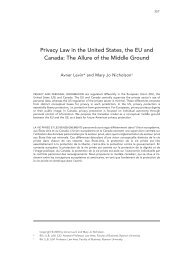Commentary on Fichte's “The Illegality of the Unauthorised ... - uoltj
Commentary on Fichte's “The Illegality of the Unauthorised ... - uoltj
Commentary on Fichte's “The Illegality of the Unauthorised ... - uoltj
Create successful ePaper yourself
Turn your PDF publications into a flip-book with our unique Google optimized e-Paper software.
(2008) 5:1&2 UOLTJ 141<br />
<str<strong>on</strong>g>Commentary</str<strong>on</strong>g> <strong>on</strong> Fichte 149<br />
*<br />
4. THEORIES OF INTELLECTUAL PROPERTY AT THE TIME OF FICHTE<br />
In Fichte’s time, <strong>the</strong>re were three main <strong>the</strong>ories <strong>of</strong> intellectual property: first,<br />
<strong>the</strong> “labour <strong>the</strong>ory” propounded by John Locke; sec<strong>on</strong>d, <strong>the</strong> utilitarian view; and<br />
third, <strong>the</strong> rights-based natural law view articulated by Immanuel Kant, which<br />
GWF Hegel developed in a slightly new directi<strong>on</strong> well after Fichte had written<br />
“Pro<strong>of</strong> <strong>of</strong> <strong>the</strong> <strong>Illegality</strong> <strong>of</strong> <strong>the</strong> <strong>Unauthorised</strong> Reprinting <strong>of</strong> Books.”<br />
The utilitarian view <strong>of</strong> intellectual property rights holds that <strong>the</strong> protecti<strong>on</strong><br />
<strong>of</strong> <strong>the</strong>se rights aims at improving social utility. This is expressed by William Fisher,<br />
who states that for utilitarians, <strong>the</strong> “lawmakers’ beac<strong>on</strong> when shaping property<br />
rights should be <strong>the</strong> maximizati<strong>on</strong> <strong>of</strong> net social welfare.” 40 The utilitarian view<br />
had initially been developed by Jeremy Bentham 41 and John Stuart Mill, 42 and<br />
it has received more recent treatment by scholars such as William Landes and<br />
Richard Posner, who explain that <strong>the</strong> purpose <strong>of</strong> copyright law is to promote<br />
ec<strong>on</strong>omic efficiency. To achieve this goal, <strong>the</strong> law must “maximize <strong>the</strong> benefits<br />
from creating additi<strong>on</strong>al works minus both <strong>the</strong> losses from limiting access and <strong>the</strong><br />
costs <strong>of</strong> administering copyright protecti<strong>on</strong>.” 43<br />
David Vaver states that modern intellectual property law, in additi<strong>on</strong><br />
to being based <strong>on</strong> <strong>the</strong> need to prevent unfair competiti<strong>on</strong> between those who<br />
incur research and development costs and those who do not, adheres to two<br />
moral imperatives: “every<strong>on</strong>e should own <strong>the</strong> product <strong>of</strong> <strong>the</strong>ir own mind; nobody<br />
should reap what <strong>the</strong>y have not sown.” 44 These two imperatives recall John<br />
Locke’s view <strong>of</strong> property. Locke argued that a pers<strong>on</strong> should be entitled to <strong>the</strong><br />
natural results <strong>of</strong> her labour and that <strong>the</strong> state <strong>the</strong>refore has an obligati<strong>on</strong> to<br />
protect this entitlement. 45 Vaver assigns normative force to Locke’s argument,<br />
although <strong>the</strong>re has been debate about whe<strong>the</strong>r Locke should be interpreted<br />
as arguing that <strong>the</strong>re are normative reas<strong>on</strong>s for rewarding labour or whe<strong>the</strong>r<br />
he simply meant that in order to motivate people to labour we must provide<br />
a reward for this labour. 46 As well, some have questi<strong>on</strong>ed whe<strong>the</strong>r Locke’s view<br />
provides a <strong>the</strong>ory <strong>of</strong> property that can apply to intellectual property, given <strong>the</strong><br />
difficulty <strong>of</strong> determining what c<strong>on</strong>stitutes “mental labour.” 47<br />
The third justificati<strong>on</strong> for property rights is a rights-based justificati<strong>on</strong><br />
derived from Kant and developed by Hegel. On this view, <strong>the</strong> exercise <strong>of</strong> human<br />
40. William Fisher, <strong>“The</strong>ories <strong>of</strong> Intellectual Property,” in Stephen R Munzer, ed., New Essays in <strong>the</strong> Legal and<br />
Political Theory <strong>of</strong> Property (Cambridge University Press, 2001) 168–199, at p. 169.<br />
41. See Jeremy Bentham, A Manual <strong>of</strong> Political Ec<strong>on</strong>omy (Putnam, 1839).<br />
42. See John Stuart Mill, Principles <strong>of</strong> Political Ec<strong>on</strong>omy, 5 th ed. (Applet<strong>on</strong>, 1862).<br />
43. William Landes and Richard A Posner, “An Ec<strong>on</strong>omic Analysis <strong>of</strong> Copyright Law,” (1989) 18 Journal <strong>of</strong> Legal<br />
Studies 325–363 at p. 326.<br />
44. David Vaver, <strong>“The</strong> Future <strong>of</strong> Intellectual Property Law: Japanese and European Perspectives Compared,”<br />
WP 09/99, OIPRC Electr<strong>on</strong>ic Journal <strong>of</strong> Intellectual Property Rights (1999), at p. 2.<br />
45. Fisher, <strong>“The</strong>ories <strong>of</strong> Intellectual Property,” supra note 40 at p. 171. See also John Locke, The Sec<strong>on</strong>d<br />
Treatise <strong>of</strong> Government (Bobbs-Merrill Company, Inc., 1952), at s.<br />
27. See also Robert Nozick, Anarchy, State, and Utopia (Basic Books, 1974) at pp. 174–182 for a discussi<strong>on</strong><br />
<strong>of</strong> Locke’s view and his famous “proviso” that <strong>the</strong>re must be “enough and as good left in comm<strong>on</strong> for<br />
o<strong>the</strong>rs” after a pers<strong>on</strong> has acquired property through mixing her labour with it.<br />
46. Justin Hughes, <strong>“The</strong> Philosophy <strong>of</strong> Intellectual Property,” (1988) 77:2 Georgetown Law Review 287–366,<br />
at p. 296.<br />
47. Fisher, <strong>“The</strong>ories <strong>of</strong> Intellectual Property,” supra note 40 at p. 185.









